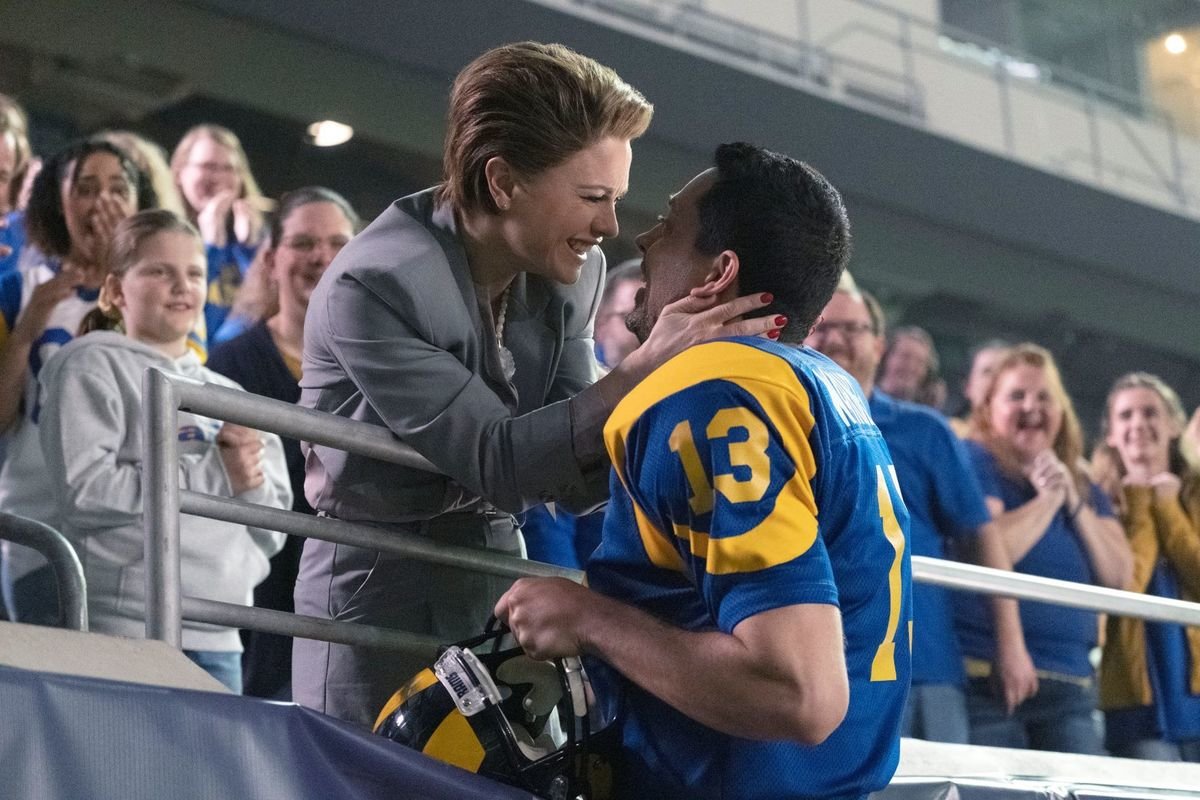

American Underdog dramatizes the real-life story of American football quarterback Kurt Warner, from inauspicious beginnings as an obscure college player and underemployed grocery store attendant to Super Bowl champion and league most valuable player.
As a set of facts, it is certainly an impressive and inspiring tale. As presented, though, it is as subtle and all-American as a big ol’ sleeve of Velveeta.
The film will be of particular interest, perhaps, to some believing moviegoers thanks to Warner’s outspoken Christianity – as part of his televised 2000 Super Bowl victory celebratory speech, for instance, he declared, “First things first, I’ve got to thank my Lord and Savior up above … thank you, Jesus!”
Those with less of a taste for Hallmark-style cinema, though, may find many of the sentiments difficult to swallow.
With strong vibes of catering to an Evangelical subculture, Underdog comes complete with deliberate expositions of the faith (“it’s more like a relationship”), prayer scenes (tearful), and heartfelt (i.e., cringe-worthy) child singing. Think God’s Not Dead with more body tackles and hugs from grade schoolers.
The dialogue is also not big on subtext. Little is left to the imagination, for instance, when Warner (played by Zachary Levi) is assured by his wife-to-be, Brenda (Anna Paquin), about the status of her faith (“It defines me”) and other interior dispositions (“I have trust issues”).
Even with such a strong cast – Underdog also features performances by Dennis Quaid, Bruce McGill, Adam Baldwin, among others – there seems to be little that can be done with a script this on-the-nose.
It might also be pointed out how there are some parallels between the uneven dramatic presentation and the representation of the main characters’ moral convictions.
Much of the explicit discourse on faith matters accompanies Warner and Brenda’s unmarried cohabitation, for example, which hardly receives comment apart from in a late-stage “man to man” exchange between Warner and Brenda’s father. Here, the patriarch of the house simply breezes past the incongruous arrangement, positively expressing (rather too readily) no doubts about the quality of Warner’s love for his daughter or the integrity of their “good Christian household.”
This is a strange oversight in a film otherwise so overtly at pains to advance a Christian point of view and suggests the kind of papering-over more indicative of a broadly “inspirational” film than a substantial presentation of faith.
Had the main characters’ unresolved moral complexities been addressed head-on, we might have been given some intriguing insights into the “work in progress” character of many Christian lives. As it stands, though, the perspective the film offers seems to amount to something like “you, too, can succeed in life if only you keep believing in the face of adversity.”
Maybe this is true in some instances, and I think we can all be glad for Kurt Warner that it proved true for him. But this message should not be mistaken for the Good News, which is much more ambiguous when it comes to consolations in the present age.
“These were all commended for their faith, yet none of them received what had been promised, since God had planned something better for us so that only together with us would they be made perfect” (Heb 11:39-40).
In other words, Christianity calls us to faithfulness and not success, or more precisely, to a kind of success that does not necessarily map onto glory this side of paradise.
Rather than simply stamping a cross on the achievements of a Superbowl MVP, then, American Underdog might have packed more of a theological punch had it applied a little more scrutiny to the unresolved contradictions in its characters’ religious lives.
Some may still find it inspirational, but as a matter of taste it almost certainly requires a particular palette to really appreciate any dish piled on with this much cheese.
